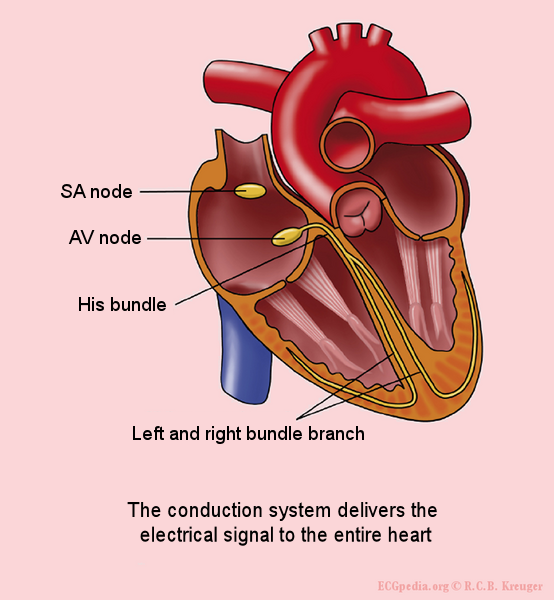Supraventricular Rhythms

Supraventricular Rhythms originate from the atria. Examples of supraventricular rhythms are:
- Atrial Premature Complexes
- Sinustachycardia
- Atrial Flutter
- Atrial Fibrillation
- Atrial Tachycardia
- AVNRT
- Atrio-ventricular Reentry Tachycardia AVRT
- AV junctional tachycardia
| regularity | atrial frequency | ventricular frequency | origin (SVT/VT) | p-wave | effect of adenosine | ||
|---|---|---|---|---|---|---|---|
| Narrow complex (QRS<0.12) | |||||||
| sinustachycardia | regular | 100-180 bpm | 100-180 bpm | sinusnode (SVT) | precedes every QRS complex | gradual slowing | |
| atrial fibrillation | grossly irregular | 400-600 bpm | 75-175 bpm | atria (SVT) | absent | slows down rate; irregularity remains | |
| atrial flutter | regular (sometimes alternating block) | 250-350 bpm | 75-150 bpm (3:1 or 2:1 block is most common) | atria (SVT) | negative sawtooth in lead II | temporary reduced conduction (e.g. 4:1) | |
| AVNRT | regular | 180-250 bpm | 180-250 bpm | AV-node (SVT) | in QRS complex (R') | stops | |
| Atrial tachycardia | regular | 120-250 bpm | 75-200 bpm | atria | precedes QRS, p wave differs from sinus-p | temporary AV-block | |
| AVRT - orthodromic | regular | 150-250 bpm | 150-250 bpm | circle: av-node - ventricles - bypass - atria | RP < PR | stops | |
| AV junctional tachycardia | regular | 60-100 bpm | 70-130 bpm | AV node | RP < PR | reduces rate | |
| Wide complex (QRS>0.12) | |||||||
| Supraventricular tachycardia with block | (ir)regular depending on SVT | 150-250 bpm | 75-200 bpm | atria (SVT) | absent | temporary increased AV-block (eg 4:1) | |
| AVRT - antidrome | regular | 150-250 bpm | 150-250 bpm | circular: bypass - atria - av-node - ventricles | RP < PR | stops | |